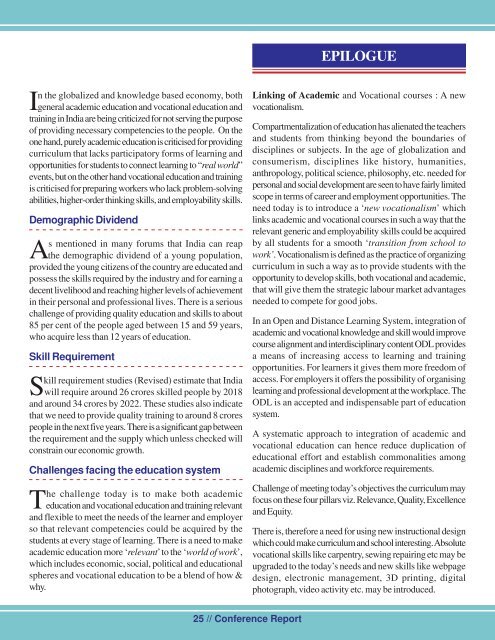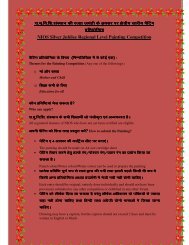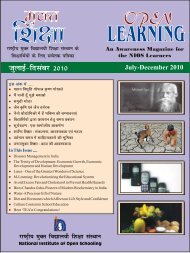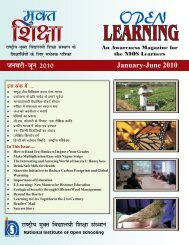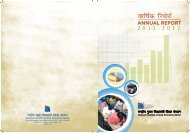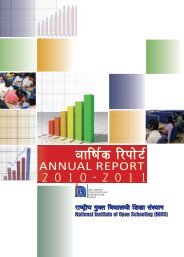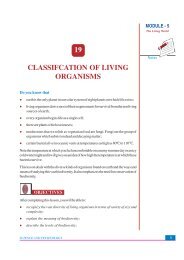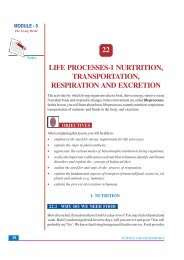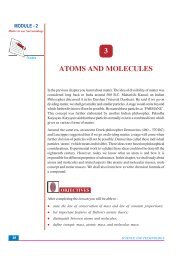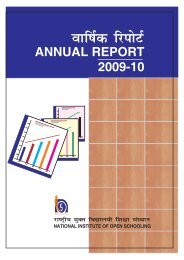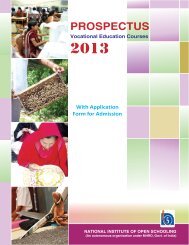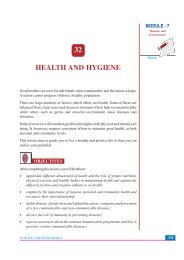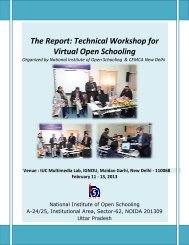Conference Report - The National Institute of Open Schooling
Conference Report - The National Institute of Open Schooling
Conference Report - The National Institute of Open Schooling
You also want an ePaper? Increase the reach of your titles
YUMPU automatically turns print PDFs into web optimized ePapers that Google loves.
EPILOGUE<br />
In the globalized and knowledge based economy, both<br />
general academic education and vocational education and<br />
training in India are being criticized for not serving the purpose<br />
<strong>of</strong> providing necessary competencies to the people. On the<br />
one hand, purely academic education is criticised for providing<br />
curriculum that lacks participatory forms <strong>of</strong> learning and<br />
opportunities for students to connect learning to “real world”<br />
events, but on the other hand vocational education and training<br />
is criticised for preparing workers who lack problem-solving<br />
abilities, higher-order thinking skills, and employability skills.<br />
Demographic Dividend<br />
As mentioned in many forums that India can reap<br />
the demographic dividend <strong>of</strong> a young population,<br />
provided the young citizens <strong>of</strong> the country are educated and<br />
possess the skills required by the industry and for earning a<br />
decent livelihood and reaching higher levels <strong>of</strong> achievement<br />
in their personal and pr<strong>of</strong>essional lives. <strong>The</strong>re is a serious<br />
challenge <strong>of</strong> providing quality education and skills to about<br />
85 per cent <strong>of</strong> the people aged between 15 and 59 years,<br />
who acquire less than 12 years <strong>of</strong> education.<br />
Skill Requirement<br />
Skill requirement studies (Revised) estimate that India<br />
will require around 26 crores skilled people by 2018<br />
and around 34 crores by 2022. <strong>The</strong>se studies also indicate<br />
that we need to provide quality training to around 8 crores<br />
people in the next five years. <strong>The</strong>re is a significant gap between<br />
the requirement and the supply which unless checked will<br />
constrain our economic growth.<br />
Challenges facing the education system<br />
<strong>The</strong> challenge today is to make both academic<br />
education and vocational education and training relevant<br />
and flexible to meet the needs <strong>of</strong> the learner and employer<br />
so that relevant competencies could be acquired by the<br />
students at every stage <strong>of</strong> learning. <strong>The</strong>re is a need to make<br />
academic education more ‘relevant’ to the ‘world <strong>of</strong> work’,<br />
which includes economic, social, political and educational<br />
spheres and vocational education to be a blend <strong>of</strong> how &<br />
why.<br />
Linking <strong>of</strong> Academic and Vocational courses : A new<br />
vocationalism.<br />
Compartmentalization <strong>of</strong> education has alienated the teachers<br />
and students from thinking beyond the boundaries <strong>of</strong><br />
disciplines or subjects. In the age <strong>of</strong> globalization and<br />
consumerism, disciplines like history, humanities,<br />
anthropology, political science, philosophy, etc. needed for<br />
personal and social development are seen to have fairly limited<br />
scope in terms <strong>of</strong> career and employment opportunities. <strong>The</strong><br />
need today is to introduce a ‘new vocationalism’ which<br />
links academic and vocational courses in such a way that the<br />
relevant generic and employability skills could be acquired<br />
by all students for a smooth ‘transition from school to<br />
work’. Vocationalism is defined as the practice <strong>of</strong> organizing<br />
curriculum in such a way as to provide students with the<br />
opportunity to develop skills, both vocational and academic,<br />
that will give them the strategic labour market advantages<br />
needed to compete for good jobs.<br />
In an <strong>Open</strong> and Distance Learning System, integration <strong>of</strong><br />
academic and vocational knowledge and skill would improve<br />
course alignment and interdisciplinary content ODL provides<br />
a means <strong>of</strong> increasing access to learning and training<br />
opportunities. For learners it gives them more freedom <strong>of</strong><br />
access. For employers it <strong>of</strong>fers the possibility <strong>of</strong> organising<br />
learning and pr<strong>of</strong>essional development at the workplace. <strong>The</strong><br />
ODL is an accepted and indispensable part <strong>of</strong> education<br />
system.<br />
A systematic approach to integration <strong>of</strong> academic and<br />
vocational education can hence reduce duplication <strong>of</strong><br />
educational effort and establish commonalities among<br />
academic disciplines and workforce requirements.<br />
Challenge <strong>of</strong> meeting today’s objectives the curriculum may<br />
focus on these four pillars viz. Relevance, Quality, Excellence<br />
and Equity.<br />
<strong>The</strong>re is, therefore a need for using new instructional design<br />
which could make curriculum and school interesting. Absolute<br />
vocational skills like carpentry, sewing repairing etc may be<br />
upgraded to the today’s needs and new skills like webpage<br />
design, electronic management, 3D printing, digital<br />
photograph, video activity etc. may be introduced.<br />
25 // <strong>Conference</strong> <strong>Report</strong>


